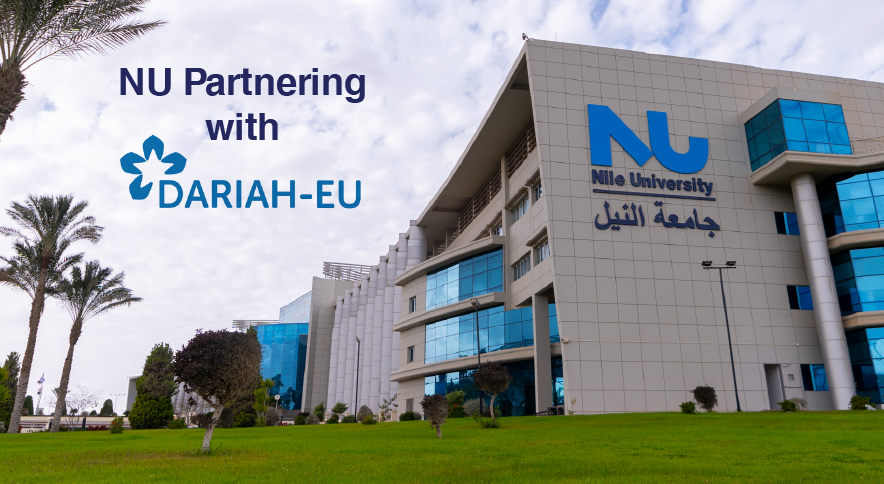
Nile University joins DARIAH as Cooperating Partner
Nile University has yet to have signed another partnership with the prestigious entity DAHRIAH-EU - The Digital Research Infrastructure for the Arts and Humanities - which aims to enhance and support digitally-enabled research and teaching across the arts and humanities. DARIAH is a network of people, expertise, information, knowledge, content, methods, tools and technologies from its member countries. It develops, maintains and operates an infrastructure in support of ICT-based research practices and sustains researchers in using them to build, analyse and interpret digital resources.
According to their website, they have also announced their partnership with us saying:
The Digital Research Infrastructure for the Arts and Humanities (DARIAH-EU) is happy to announce it has signed a new Cooperating Partnership agreement with Nile University (NU) in Giza, Egypt.
DARIAH is a European Research Infrastructure Consortium (ERIC) whose mission is to empower research communities with digital methods to create, connect and share knowledge about culture and society. In addition to having 22 Member states, DARIAH has also established a network of cooperating partners in non-member countries.
“On behalf of the Board of Directors of DARIAH-EU, I would like to extend our enthusiasm for the new Cooperating Partnership between DARIAH-EU and Nile University in Giza, Egypt. This collaboration, the first of DARIAH-EU with an Arab country, marks a significant stride towards our mission of empowering research communities with digital methods to create, connect, and share knowledge about culture and society” said Agiatis Benardou, DARIAH-EU Director.
Nile University is conceived to be a leader in technology and business education in Egypt and the Middle East/North Africa (MENA) region. It aims to prepare competent graduates to address local and regional challenges, and to contribute in fulfilling the needs and aspirations of the MENA region. The new School of Digital Humanities will collaborate with the existing NU School of Information Technology and Computer Science, which would introduce Egyptian, Arab and other international students to a developing field that does change a lot and rapidly. This will constitute remarkable opportunities for experiential learning and community-led action research, and toward establishing a vigorous collaboration across disciplines to address the “science of culture” through the methods of culture analytics and Digital Humanities.
Integration with DARIAH
This partnership between the School of Digital Humanities at Nile University and DARIAH offers several opportunities for growth, innovation, and knowledge exchange. One of the immediate benefits would be the opportunity to jointly organise major conferences and workshops in the field of Arabic Digital Humanities. These events would serve as platforms for sharing research, fostering collaboration, and addressing critical issues in the region. Examples of planned activities and participation in DARIAH bodies and initiatives include the foundation of the first-ever Working Group on Arabic Digital Humanities that would provide a collaborative platform for scholars to collectively advance knowledge of Arabic and Islamic culture and history using digital methods and resources. The new Working Group aspires to collaborate with the DARIAH-EU Multilingual DH Working Group to explore cross-linguistic research opportunities that involve Arabic and other languages, facilitating the exchange of methodologies and best practices for working with diverse linguistic datasets. Other initiatives include organising a ‘DARIAH Day’ in several Arabic countries with the goal of showcasing research initiatives and attracting potential partners, stakeholders and funding agencies.
“This Cooperating Partnership holds great promise for knowledge exchange” said Agiatis Benardou. “Together with our Egyptian colleagues, we envision organising events in Arabic Digital Humanities, creating platforms for research sharing, collaboration, and addressing critical issues in Digital Arts and Humanities research in the region”.
Collaboration with DARIAH would provide the NU’s faculty and students with access to a wealth of knowledge, resources, and expertise in the field of Digital Humanities. This exposure to cutting-edge research, methodologies, and tools would significantly enhance the academic programmes and research, facilitating the development of digital tools and methods tailored to the specific needs of the Arabic language and culture. Such collaboration could lead to the recruitment of visiting scholars and post-doctoral fellows who specialise in areas complementary to the expertise of the NU’s faculty.
“This partnership will help our efforts in Egypt to collaborate with international partners in analysing and documenting born-digital cultural heritage – e.g alternate reality games, online videos, social media posts/tweets, etc. The new School of Digital Humanities at Nile University is envisioned to be a hub that nurtures research, teaching, and study of societies and cultures in a global context. The aim of its collaboration with DARIAH is to promote a holistic approach and to facilitate a common conversation about Eastern and Western societies and cultures, as well as the different traditions that continue to develop within them. Through many activities under this collaboration, we anticipate equiping Egyptian and Arab students with digital tools and computational techniques to explore new modes of doing research in the humanities and social sciences.” said Eid Mohamed, Founder of the new School of Digital Humanities at Nile University.
Nile University’s location in Egypt provides DARIAH with an entry point to a region with rich cultural and historical significance. This collaboration could potentially lead to partnerships with other institutions in the Middle East and North Africa, further extending DARIAH’s regional influence. Collaboration with NU would provide DARIAH with valuable access to expertise and insights into the specific challenges and opportunities of Digital Humanities in the Arab world. This regional focus can enrich DARIAH’s understanding of diverse cultural contexts and expand its global reach.
